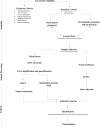Association of catechol-o-methyltransferase gene polymorphism with preeclampsia and biomarkers of oxidative stress: Study protocol for a prospective case-control study in Pakistan
- PMID: 38861573
- PMCID: PMC11166270
- DOI: 10.1371/journal.pone.0304314
Association of catechol-o-methyltransferase gene polymorphism with preeclampsia and biomarkers of oxidative stress: Study protocol for a prospective case-control study in Pakistan
Abstract
Background: Preeclampsia is one of the three leading causes of worldwide maternal mortality. Oxidative stress-mediated endothelial damage is expected to be an ultimate common mechanism in the pathophysiology of preeclampsia. The role of bioamines is also well-established in the induction of preeclampsia. This project is aimed to understand the factors which may affect the induction, progression, and aggravation of preeclampsia and oxidative stress during pregnancy. This study will explore the methylation pattern of the Catechol-O-methyltransferase gene to determine its role in the pathogenesis of preeclampsia, association of Val158Met polymorphism with a wide range of oxidative stress biomarkers, major antioxidants vitamins, and blood pressure regulating amines in preeclamptic Pakistani women.
Methods and analysis: In this prospective case-control study, 85 preeclamptic and 85 normotensive pregnant women will be recruited in their third trimesters. DNA will be extracted from peripheral blood and Val158Met polymorphism in the Catechol-O-methyltransferase gene will be examined on PCR amplified product digested with Hin1II (NlaIII) restriction enzyme, further validated by Sanger sequencing. Methylation-sensitive PCR will also be performed. Oxidative stress biomarkers, antioxidant vitamins, bioamines, and catechol-O-methyltransferase levels will be measured by ELISA. The data will be used to correlate maternal and fetal outcomes in both groups.
Discussion: This study will help to identify and understand the multifactorial path and cause-effect relationship of gene polymorphism, oxidative stress biomarkers, major antioxidants vitamins, and blood pressure regulating amines in the pathogenesis and aggravation of preeclampsia in the Pakistani population. The outcome of this project will be particularly helpful in reducing the incidence of preeclampsia and further improving its management.
Copyright: © 2024 Yousuf et al. This is an open access article distributed under the terms of the Creative Commons Attribution License, which permits unrestricted use, distribution, and reproduction in any medium, provided the original author and source are credited.
Conflict of interest statement
The authors have declared that no competing interests exist.
Similar articles
-
Fetal Val108/158Met catechol-O-methyltransferase (COMT) polymorphism and placental COMT activity are associated with the development of preeclampsia.Fertil Steril. 2016 Jan;105(1):134-43.e1-3. doi: 10.1016/j.fertnstert.2015.09.019. Epub 2015 Oct 9. Fertil Steril. 2016. PMID: 26450530
-
VAL158MET catechol O-methyltransferase polymorphism contributes to the development of preeclampsia.Hypertens Pregnancy. 2020 Nov;39(4):471-480. doi: 10.1080/10641955.2020.1843663. Epub 2020 Nov 6. Hypertens Pregnancy. 2020. PMID: 33155880
-
Genetic polymorphism of catechol-O-methyltransferase and cytochrome P450c17α in preeclampsia.Pharmacogenet Genomics. 2010 Oct;20(10):605-10. doi: 10.1097/FPC.0b013e32833df033. Pharmacogenet Genomics. 2010. PMID: 20729792
-
Comprehensive analysis of oxidative stress markers and antioxidants status in preeclampsia.Taiwan J Obstet Gynecol. 2018 Dec;57(6):779-790. doi: 10.1016/j.tjog.2018.10.002. Taiwan J Obstet Gynecol. 2018. PMID: 30545527 Review.
-
Genes and the preeclampsia syndrome.J Perinat Med. 2008;36(1):38-58. doi: 10.1515/JPM.2008.004. J Perinat Med. 2008. PMID: 18184097 Review.
References
MeSH terms
Substances
LinkOut - more resources
Full Text Sources
Molecular Biology Databases
Miscellaneous


